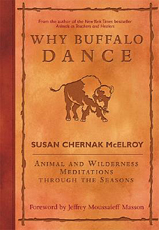"I stabbed the fire again, harder, and sparks danced like ghosts above the flames. Melancholy, shame, helplessness, profound injustice: these are a few of the cold spirits that can poke a sharp, thin icicle into the heart and freeze the very life out of it.
"I watched the sparks die, become bits of icy ash, and settle in shadowy blots on the snow. Hello, depression! Remember when you came and stayed and stayed? Shame. Go away. I never want to speak to you. You always show up at the worst times. There must be gifts, I thought, ripened in me over the centuries to protect my core from these dead-cold visitors that can make any season feel like winter. What insulates my heart?
"An answer came to me unexpectedly. I cocked my head to hear an owl in the far distance. On clear nights, sound travels a long way. I uncovered my ears and listened more closely: Whoot-whoo-whoo-whoot-whoot. Shortly, they'd be calling to each other, signifying the beginning of another breeding season. As the longest night stretched out in front of me, the owl's call hinted of a time to come when the ice would be gone, eggs would hatch, and owlets would trill. Great horned owls are harbingers of transition, the first creatures here to give voice to the growing season just around the bend. They are also associated with the transformation of life into death, and so touch each season of life with their haunting calls.
"Many times I could not imagine anything existing beyond the dark, threatening seasons of my life. Those days were like living in a perpetual ice age, when my interior heat was constantly in danger of being snuffed out by the spirit of deep inner cold. On every horizon, icicles seemed to surround me, dangling from sky to earth, and the warmth of hope was a dim faltering light.
"Hopelessness is like getting your skin wet and exposed in winter — all the heat leaches out of you, and the ice finds your heart, and that is that. But on solstice night, I heard the faint hooting of the owl. Even more than that, I heard the promise of renewal whispered in the tones of his call. Perhaps I heard him because I had lived through a half century of winters, and my ears were open to a simple faith that winter ends and hope lives.
"Hope is not a gift we can sustain simply by our own will. Hope is something we need to hear from outside ourselves sometimes. Like the fire needs the help of a branch to grow its warmth, we need a voice sometimes, or a sight, or visitor, to fan the flicker in our hearts when faith grows dim. On solstice, the voice came to me in the call of the owl, but nature has endless other voices that speak of hope: the sound of water to a thirsty creature, the breath of sunshine on a cold one, the call of kin and kind to one who is lost.
"The owl's hoot — more a vibration than a sound — wrapped around me like a down cape, insulating me from the most chilling of life's spirits. This melancholy will end. This darkness of loss will find its way to light again. This wound will be healed someday. The cold will move on.
"I wondered if the winter creatures felt the thrumming hoot of the owl in their own hearts. Perhaps the call settled into their bodies as a small fire, much like the gift of hope that warms me through the most frigid of inner nights. Yet if the owl call touched them, it touched them as a remembrance of what they already knew on faith alone. So untarnished is their covenant with life, they endure on unwavering faith, not as a mental construct, but as a felt knowing. For me, for all humankind, there remains the gift of hope when faith wears thin. I don't know how long I sat listening to the owls, watching my small fire glow, then fade. I didn't look at a clock before I went outside, and I would not look at one when I got back into the house. When the last ember died, I woke the dogs and headed back to the cabin, carrying the owl's small fire in my cold hands."
